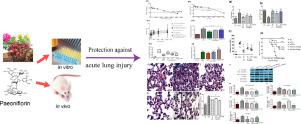Phytomedicine ( IF 7.9 ) Pub Date : 2021-08-21 , DOI: 10.1016/j.phymed.2021.153724 Wendi Yu 1 , Maosen Zeng 1 , Peiping Xu 1 , Jinyuan Liu 2 , Huixian Wang 1

|
Background
Influenza often leads to acute lung injury (ALI). Few therapeutics options such as vaccines and other antiviral drugs are available. Paeoniflorin is a monoterpene glucoside isolated from the roots of Paeonia lactiflora Pall. that has showed good anti-inflammatory and anti-fibrotic effects. However, it is not known whether paeoniflorin has an effect on influenza virus-induced ALI.
Purpose
To investigative the protective effect and potential mechanism of paeoniflorin on ALI induced by influenza A virus (IAV).
Study design and methods
The anti-influenza activity of paeoniflorin in vitro was investigated. Influenza virus A/FM/1/47 was intranasally infected in mice to induce ALI, and paeoniflorin (50 and 100 mg/kg) was given orally to mice during 5 days, beginning 2 h after infection. On day 6 post-infection, body and lung weights, histology and survival were observed, and the lungs were examined for viral load, cytokine and cellular pathway protein expression.
Results
Results showed that paeoniflorin (50 and 100 mg/kg) reduced IAV-induced ALI. It reduces pulmonary oedema and improves histopathological changes in the lung, and also diminishes the accumulation of inflammatory cells in the lung. It was shown that paeoniflorin (50 and 100 mg/kg) alleviated IAV-induced ALI, as evidenced by improved survival in infected mice (40% and 50%, respectively), reduced viral titer in lung tissue, improved histological changes, and reduced lung inflammation. Paeoniflorin also improves pulmonary fibrosis by reducing the levels of pulmonary fibrotic markers (collagen type IV, alpha-smooth muscle actin, hyaluronic acid, laminin, and procollagen type III) and downregulating the expression levels of type I collagen (Col I) and type III collagen (Col III) in the lung tissues. Additionally, paeoniflorin inhibits the expression of αvβ3, TGF-β1, Smad2, NF-κB, and p38MAPK in the lung tissues.
Conclusion
The results showed that paeoniflorin (50 and 100 mg/kg) protected against IAV-induced ALI, and the underlying mechanism may be related to the reduction of pro-inflammatory cytokine production and lung collagen deposition through down-regulation of activation of αvβ3/TGF-β1 pathway in lung tissue.
中文翻译:

芍药苷对甲型流感病毒所致小鼠急性肺损伤的影响。其作用机制的证据
背景
流感通常会导致急性肺损伤 (ALI)。可用的治疗方法很少,例如疫苗和其他抗病毒药物。Paeoniflorin 是一种单萜葡萄糖苷,从Paeonia lactiflora Pall的根中分离出来。已显示出良好的抗炎和抗纤维化作用。然而,尚不清楚芍药苷是否对流感病毒引起的 ALI 有影响。
目的
探讨芍药苷对甲型流感病毒(IAV)所致ALI的保护作用及潜在机制。
研究设计和方法
研究了芍药苷的体外抗流感活性。流感病毒 A/FM/1/47 在小鼠中鼻内感染以诱导 ALI,并在 5 天内口服给予小鼠芍药苷(50 和 100 mg/kg),从感染后 2 小时开始。在感染后第 6 天,观察体重和肺重量、组织学和存活率,并检查肺的病毒载量、细胞因子和细胞通路蛋白表达。
结果
结果表明芍药苷(50 和 100 mg/kg)可降低 IAV 诱导的 ALI。它可以减少肺水肿并改善肺部的组织病理学变化,还可以减少肺部炎症细胞的积聚。结果表明,芍药苷(50 和 100 毫克/千克)可减轻 IAV 诱导的 ALI,这可以通过提高受感染小鼠的存活率(分别为 40% 和 50%)、降低肺组织中的病毒滴度、改善组织学变化和减少肺部炎症。芍药苷还通过降低肺纤维化标志物(IV 型胶原蛋白、α-平滑肌肌动蛋白、透明质酸、层粘连蛋白和 III 型原胶原蛋白)的水平并下调 I 型胶原蛋白 (Col I) 和 III 型胶原蛋白的表达水平来改善肺纤维化肺组织中的胶原蛋白(Col III)。此外,
结论
结果表明,芍药苷(50 和 100 mg/kg)对 IAV 诱导的 ALI 具有保护作用,其潜在机制可能与通过下调 αvβ3/TGF 的激活减少促炎细胞因子的产生和肺胶原沉积有关肺组织中的 -β1 通路。


























 京公网安备 11010802027423号
京公网安备 11010802027423号